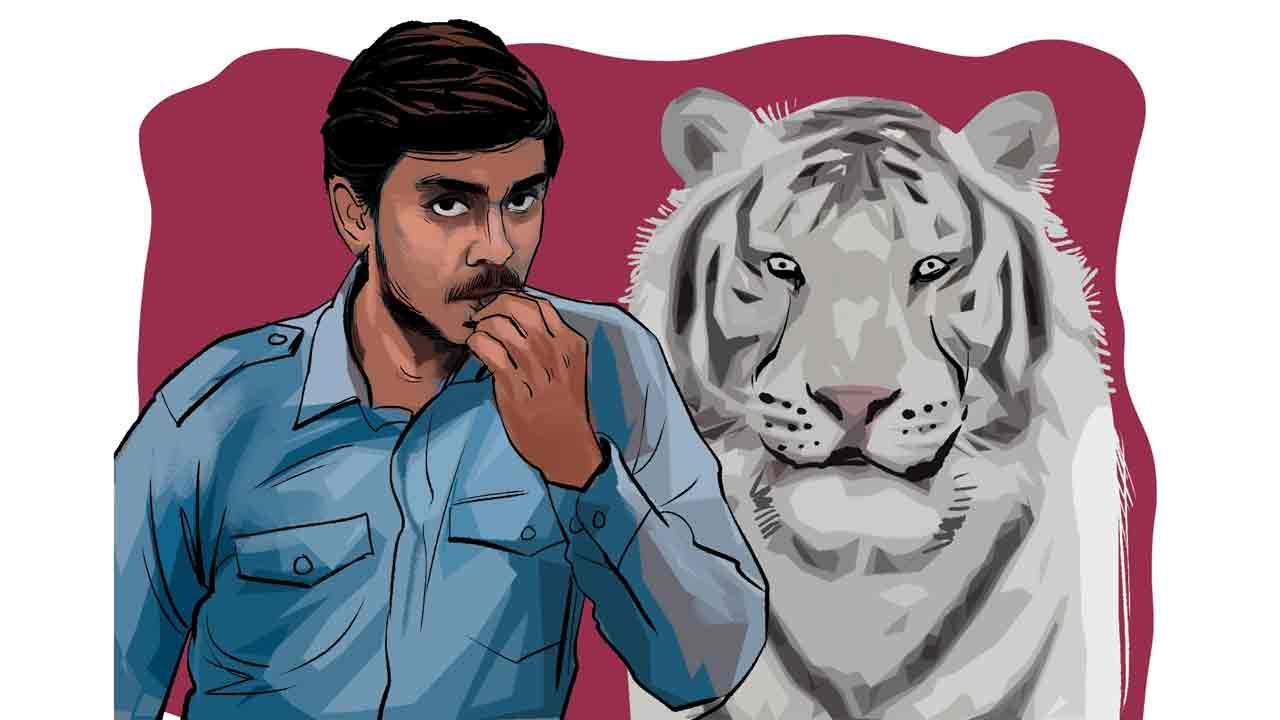The strange thing about The White Tiger, the much-awaited film that dropped on Netflix on Friday, is that it is such a ‘talkie’ film.

Illustration/Uday Mohite
![]() The strange thing about The White Tiger, the much-awaited film that dropped on Netflix on Friday, is that it is such a ‘talkie’ film. The protagonist, Balram Halwai, talks and talks—mostly as a voiceover to himself (uh-oh), or to an imaginary figure, as well as to others. In its anxiety to cover max ground from Aravind Adiga’s Man Booker prize-winning eponymous book of 2008, on which it is based, it junks the proven show-don’t-tell formula, for a show-and-tell film. This is a pity, because the book is a solid and terrific read, and its politics of the underdog in the new India, spot-on.
The strange thing about The White Tiger, the much-awaited film that dropped on Netflix on Friday, is that it is such a ‘talkie’ film. The protagonist, Balram Halwai, talks and talks—mostly as a voiceover to himself (uh-oh), or to an imaginary figure, as well as to others. In its anxiety to cover max ground from Aravind Adiga’s Man Booker prize-winning eponymous book of 2008, on which it is based, it junks the proven show-don’t-tell formula, for a show-and-tell film. This is a pity, because the book is a solid and terrific read, and its politics of the underdog in the new India, spot-on.
ADVERTISEMENT
With big guns backing The White Tiger, it has ‘globalised Indian film’ stamped all over it. Produced by Mukul Deora (who also produced Bheja Fry) and Ramin Bahrani, its executive producers include Oscar-nominated Ava DuVernay (whose Array also distributed Deepa Mehta’s Funny Boy), and it stars Priyanka Chopra Jonas, Rajkummar Rao and surprise package Adarsh Gourav. It is directed by Ramin Bahrani, multiple award-winning American director of Iranian origin (and Adiga’s college buddy), who has directed and produced about 19 films and series, according to imdb.com. Bahrani’s films include 99 Homes, that was at the Venice and Toronto Film Festivals, and Fahrenheit 451.
The White Tiger is about Balram Halwai, a low caste villager who becomes a driver to the wealthy Sharmas in Delhi. He’s inured to endless humiliation by his rich employers, until one day, one of the family members, driving the car, accidentally runs over a kid, and Balram is forced to take the rap, and that changes their equation. Remember Salman Khan’s case? But Adiga/Bahrani offer a more satisfying ending than the pathetic ‘justice’ the victims got in real life in the Bollywood star’s case.
Beyond generating a huge middle class, India’s liberalisation further exacerbated its already extreme economic inequalities. Many Indian films have addressed the class divide, including Zoya Akhtar’s Gully Boy, Dharmesh Darshan’s Raja Hindustani, Shyam Benegal’s Ankur (Hindi), Girish Kasaravalli’s Thai Saheba (Kannada) and Anjali Menon’s Manjadikuru (Lucky Red Seeds, Malayalam). But the more recent Bong Joon-Ho’s Palme d’Or and four Oscar-winning Parasite (Korea) and Rohena Gera’s Sir, underline insurmountable domestic class divisions, whereas White Tiger throws a googly.
While Indian author Adiga held an unforgiving mirror to his own society, the film does have a Western, somewhat Slumdogified gaze at India, with poverty, shitting in public, gods and monkeys, but worse, compounded by an NRI gaze at India, as the driver teaches Chopra Jonas and Rao how to pray Hindu-style (uff!). Otherwise, Bahrani’s direction is assured. His screenplay (and the book) addresses complex issues, including India’s caste, class, ambition, the ghoos (bribe) culture, and how older women control domestic economic power by getting sons married young. The laboured, wall-to-wall voiceover is a drag, though.
Rao is efficient as Ashok, the US-returned, decent employer with a conscience. Chopra Jonas, as his wife Pinky Madam, tries to fit into a role that is neither meaty nor convincing. Mahesh Manjrekar plays the nasty zamindar dad trope to the T. But Gourav, who plays Balram, and whose smiling appetite for humiliation conceals a seething rage, is unquestionably an explosive talent, and a man to watch. Paolo Carnera’s cinematography is strong, but Tim Streeto’s editing should have shown no mercy. Overall, a crackling portrait of contemporary India: the revolution won’t be televised, but it is closing in all around us.
Meenakshi Shedde is India and South Asia Delegate to the Berlin International Film Festival, National Award-winning critic, curator to festivals worldwide and journalist. Reach her at meenakshi.shedde@mid-day.com
 Subscribe today by clicking the link and stay updated with the latest news!" Click here!
Subscribe today by clicking the link and stay updated with the latest news!" Click here!







